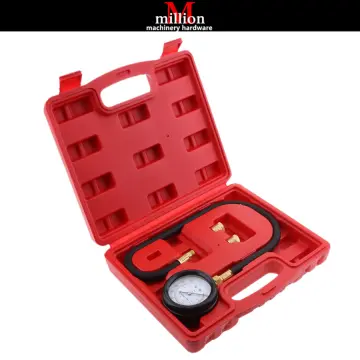Essential Guide to Utilizing Car Engine Oil Pressure Testers
As a car owner, mechanic, or automotive enthusiast, understanding the performance of your car's engine is crucial for its longevity and overall health. One essential component to monitor is the engine oil pressure, which serves as an indicator of how well your engine is functioning. To accurately measure this pressure, specialized tools known as car engine oil pressure testers are used.
In this comprehensive guide, we will explore the functions, types, operation, and applications of car engine oil pressure testers. By the end, you will have a better understanding of how these testers can help you maintain and improve the performance of your car's engine.
The Ultimate Troubleshooting Tool: Car Engine Oil Pressure Testers

Car engine oil pressure testers serve multiple functions, making them an invaluable tool for car owners and mechanics alike. Let's take a closer look at each of their primary functions:
Measuring Oil Pressure
The most crucial function of car engine oil pressure testers is to measure the pressure exerted by the engine's oil pump. This pressure ensures that oil is adequately circulated throughout the engine, lubricating critical components such as bearings, pistons, and camshafts. Without proper oil pressure, these components can suffer from excessive friction and wear, leading to costly repairs or even engine failure.
Using an oil pressure tester, you can get precise readings of the pressure within your engine, allowing you to identify any potential issues early on before they escalate into more significant problems.
Diagnosing Engine Problems
Abnormal oil pressure readings can be a sign of underlying engine issues. A low reading may indicate a worn-out oil pump, while a high reading could point to a faulty pressure regulator or clogged oil passages. By using a car engine oil pressure tester, you can diagnose these problems accurately and promptly, preventing further damage and saving time and money in the long run.
Moreover, regular oil pressure testing can also help identify any changes in pressure over time, which can indicate wear and tear on certain engine components. This information can help you plan for preventive maintenance to keep your engine running smoothly.
Maximizing Car Engine Performance with Oil Pressure Testers

Aside from troubleshooting engine problems, car engine oil pressure testers can also improve the overall performance of your car's engine. By ensuring optimal oil pressure, you can minimize friction and extend the life of your engine, resulting in a smoother and more efficient driving experience.
Improved Lubrication
As mentioned earlier, maintaining proper oil pressure is vital in ensuring that critical components of your engine are adequately lubricated. With precise oil pressure readings, you can make necessary adjustments to ensure all engine parts receive the right amount of oil, reducing friction and wear.
This is especially crucial for high-performance vehicles or those used for racing, where engines are subjected to extreme conditions and require superior lubrication to perform at their best.
Better Fuel Efficiency
A well-lubricated engine also translates to better fuel efficiency. As friction decreases, the engine does not have to work as hard, resulting in less energy wasted and, ultimately, fewer trips to the gas station. Regular oil pressure testing can help you determine if your engine is running at its optimal level, allowing you to make necessary adjustments and save money on fuel costs in the long run.
Extended Engine Life
Proper oil pressure is essential in preventing premature wear and tear on engine components. By regularly checking your engine's oil pressure, you can catch potential issues before they escalate, saving you from expensive repairs or even engine replacement. Ultimately, this leads to a longer lifespan for your engine and a more reliable vehicle.
Unlocking the Secrets of Car Engine Health: Oil Pressure Testers

Now that we've discussed the functions and benefits of car engine oil pressure testers let's explore how these testers work and the different types available.
How Do Oil Pressure Testers Work?
Oil pressure testers typically consist of a gauge, a hose, and an adapter that connects to the engine. The gauge displays the pressure reading in either PSI (pounds per square inch) or kPa (kilopascal), depending on the model. The hose is connected to the adapter and inserted into the oil pressure port on the engine.
The tester works by creating a seal around the oil pressure port and measuring the pressure within the engine through the hose. The gauge then displays the pressure reading, allowing you to determine if it falls within the normal range for your specific engine.
Types of Oil Pressure Testers
There are two primary types of car engine oil pressure testers: mechanical and electronic.
Mechanical Oil Pressure Testers
Mechanical oil pressure testers use a mechanical gauge to measure oil pressure. They are often referred to as "analog" testers as they display readings on a traditional gauge with a needle and numerical markings. These testers are simple to use and are often more affordable than their electronic counterparts.
However, mechanical oil pressure testers may not be as accurate as electronic ones, and their readings can be affected by external factors such as vibrations from the engine.
Electronic Oil Pressure Testers
Electronic oil pressure testers use a digital display to show pressure readings, making them more precise and easy to read. They also come with additional features such as data recording, which allows you to track pressure changes over time, and alerts for abnormal readings.
However, these testers tend to be more expensive than mechanical ones, and their digital display may be prone to malfunctions or damage from exposure to extreme heat or cold.
The Comprehensive Manual for Car Engine Oil Pressure Testing

Now that you have a better understanding of how car engine oil pressure testers work let's dive deeper into their applications and best practices for using them.
When Should You Use an Oil Pressure Tester?
It is recommended to use an oil pressure tester during routine maintenance checks and whenever you suspect any issues with your engine's performance. Here are some scenarios where an oil pressure test can be beneficial:
- After changing the oil: Performing an oil pressure test after an oil change can help ensure that the new oil is adequately circulating through the engine.
- Check engine light: If the check engine light illuminates, an oil pressure test can help determine if the issue is related to oil pressure.
- Low oil pressure warning: If your car has a low oil pressure warning system, it is essential to perform a test immediately when the warning light turns on.
- Engine overheating: Overheating can be caused by a lack of proper lubrication, which can be identified through an oil pressure test.
- Abnormal engine noises: Unusual sounds coming from your engine can indicate potential issues with oil pressure and should prompt an immediate test.
How to Use an Oil Pressure Tester
Using a car engine oil pressure tester is relatively straightforward, but it's crucial to follow these steps for accurate results:
- Park your car on level ground and let it cool down for at least 15 minutes before testing.
- Locate the oil pressure port on your engine. It is usually located near the oil filter or oil pan and may have a red or yellow cap.
- Remove the cap and screw in the adapter provided with the tester.
- Connect the hose to the adapter and secure it tightly.
- Start the engine and let it idle.
- Read the pressure reading on the gauge and compare it to your engine's specifications. Typically, oil pressure readings should fall between 25-65 PSI, depending on the make and model of your car.
- If the reading falls outside the normal range, refer to your car's manual for further instructions on how to address the issue.
Empowering Car Owners: The Benefits of Car Engine Oil Pressure Testers
:max_bytes(150000):strip_icc()/turo-car-owner-TURO0921-e5927903a1674240b0e88f23c6e08705.jpg)
Car engine oil pressure testers are not just for professional mechanics. They can be an invaluable tool for car owners as well. Here are some of the benefits that come with using a car engine oil pressure tester:
Cost Savings
By regularly monitoring your engine's oil pressure, you can catch potential issues early on before they escalate into more significant and costly problems. This can save you from expensive repairs or even engine replacement in the long run.
Moreover, by ensuring optimal oil pressure, you can also improve fuel efficiency, leading to more savings on gas expenses.
Peace of Mind
Knowing that your engine is running at an optimal level can give you peace of mind and confidence when driving. With regular oil pressure testing, you can rest assured that your car's engine is in good health and performing at its best.
Empowerment Through Knowledge
As a car owner, it's essential to have a basic understanding of your car's mechanics. By using a car engine oil pressure tester, you can gain valuable insights into how your engine operates and identify any potential issues before they become major problems.
Conclusion
In conclusion, car engine oil pressure testers are essential tools for maintaining and improving the performance of your car's engine. By providing accurate measurements of oil pressure, these testers allow you to diagnose engine problems, improve fuel efficiency, and extend the life of your engine. As a car owner, investing in a car engine oil pressure tester is a wise decision that will not only save you money but also empower you to take better care of your vehicle. So, make sure to add this tool to your arsenal and keep your engine running smoothly for years to come.



